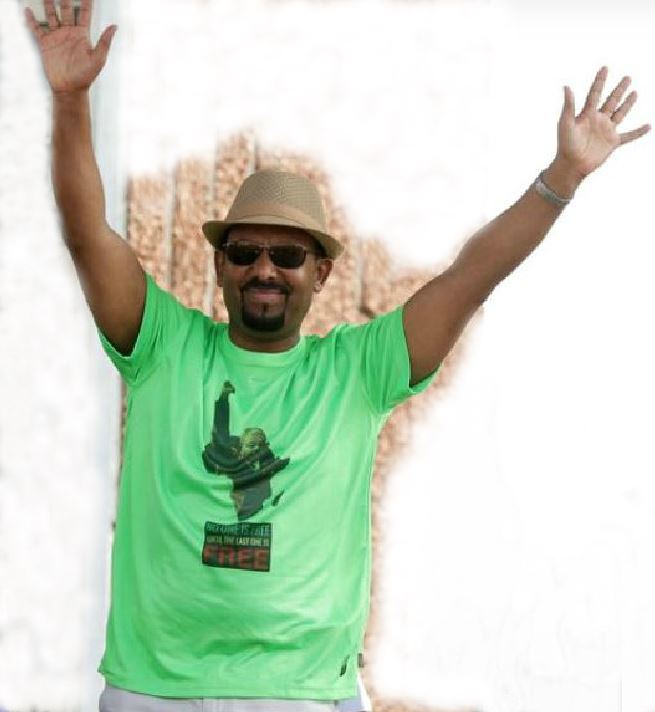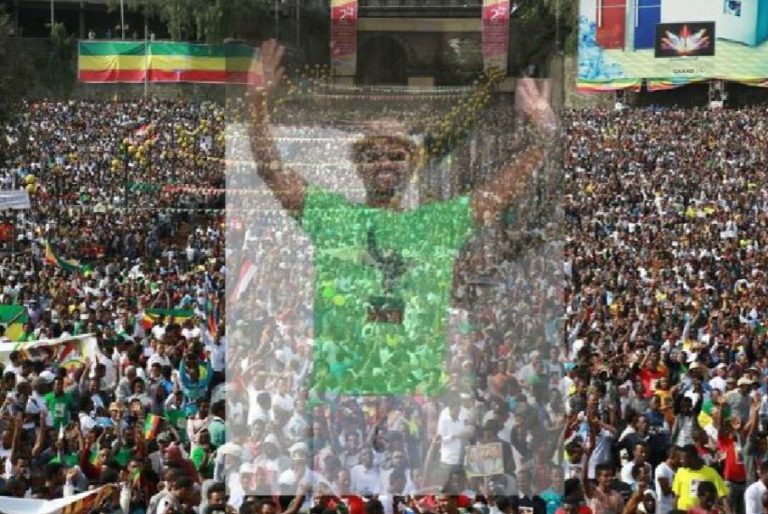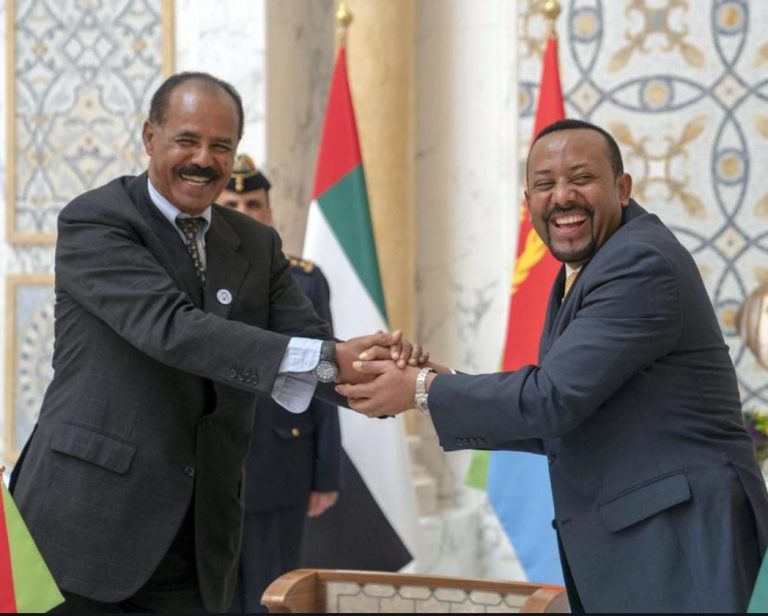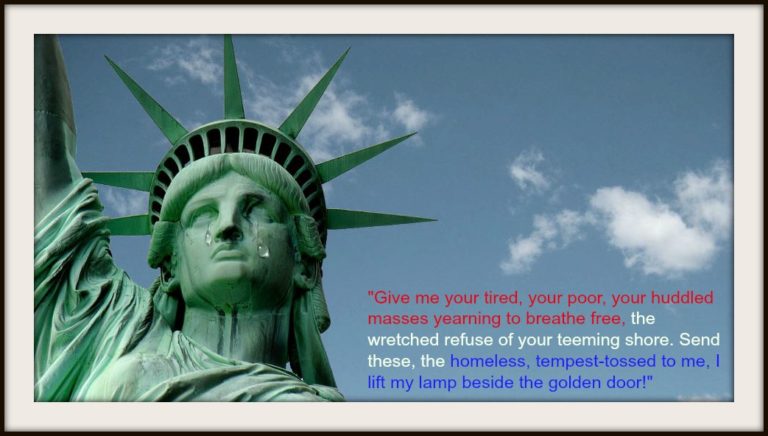Happy 800th Birthday, Magna Carta!
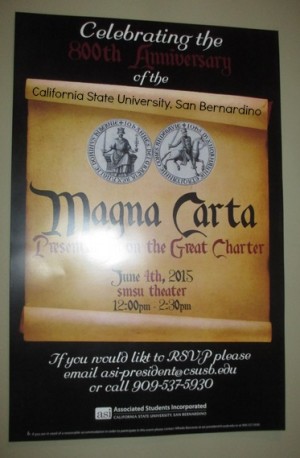
Today, June 15, 2015, is the 800th anniversary of the Magna Carta Libertatum or the Great Charter of English Liberties. On that date, King John of England affixed his seal on the Magna Carta and formally accepted the principle of the rule of law, specific and sweeping limitations on his royal power.
In place of my regular Monday Commentary, I am proud to present the speeches given by my students on the occasion of the 800th anniversary celebration of the Magna Carta on my campus, the California State University, San Bernardino.
I have “crowed” from time to time that I have never missed posting a Monday Commentary in years. That would be nine years of uninterrupted weekly commentaries (as some would affectionately call them “sermons’) to date.
Well, that claim ends today, June 15, 2015.
I can think of no better occasion or time to yield the floor to the younger generation and watch them carry the torch and march onward in the defense of the rule of law and the liberties we hold so dear as free human beings and Americas.
This is one of my proudest moments as a university professor. I can imagine no greater honor than seeing my students rise up to uphold the principle of the rule of law, a principle to which I have dedicated my life.
I am a great fan of the Magna Carta. I developed an appreciation for the rule of law at a very tender age. I have told my story in my commentary, “A Magna Carta for Ethiopia”, which, I am proud to say, is posted on the official website of the Magna Carta Committee operating under the Magna Carta Trust.
I am a fan of the Magna Carta for two reasons.
First, The Magna Carta marks the first time in recorded human history in which the ruled told their rulers what to do and not do. That is a revolutionary concept — timeless, ageless and deathless . I wish to see it practiced widely in Africa, particularly in my birth country of Ethiopia.
Second, the Magna Carta means the rule of law, which means right makes might. The weak shall not fear the strong. To paraphrase Thomas Jefferson, “Where there is the rule of law, there is liberty. Where there is liberty, governments fear the people. When governments fear the people, the bell tolls for tyranny.”
I believe I am right in claiming that our university is the only institution of higher education in the United States to hold a major student-sponsored celebratory event (we prefer to call it a birthday party) for the Magna Carta. I am prepared to stand corrected if our claim can be disproved.
I am deeply grateful to the students who organized the Magna Carta celebrations on our campus. I give the students full credit for managing, coordinating and organizing the event. They went out and obtained the funding; they arranged the facilities; they managed the advertising; they provided the technical support and they did all the presentations. I just watched them in amazement and awe as they went about doing their thing. I am grateful to them for letting me be part of their event as their adviser.
I am especially grateful to our students for taking on the added responsibility of the Magna Carta event in addition to all of their other responsibilities.
Some of the student participants are taking double the normal college course load. Some of them are taking extremely challenging seminars with an extraordinarily heavy load of reading and writing assignments. (They know that I am completely deaf when it comes to complaints about reading long articles and writing long research papers, legal briefs, critical reviews of court decisions, commentaries and much more.) Some of them are doing both and carrying additional responsibilities by serving as student leaders on campus and working to support themselves. They all went “above and beyond the call of duty” in their preparation for the event. Despite the extraordinary demands and limited time they had to prepare, all of them delivered outstanding presentations.
I am very proud of them!
I am also proud to say that the CSUSB students who presented in the Magna Carta celebrations, and many others like them, will be the guardians and defenders of American liberties for decades to come. They will be the torch bearers and beacons of our constitutional liberties.
But I believe they will be and do much more than that. They will be defenders of human rights and human dignity all over the world.
I have no doubts that they will one day be the strong and unsilenceable voices for the unheard, the ignored, the defenseless and powerless from America to Zimbabwe.
California State University, San Bernardino (CSUSB) is “highest ranked” among public colleges and universities in the 2015 Best Colleges (West) rankings.
The student presenters in this event and many others like them are the reasons why CSUSB has consistently earned such high rankings.
The student presentations below have been edited for clarity and space; points omitted in the extemporaneous speeches have been included. A brief “bio” of each presenter is provided at the end.
 Arlene Carrillo
Arlene Carrillo
What is the Magna Carta?
Welcome to our celebration of the 800th Anniversary of the Magna Carta. I am going to talk to you about the Magna Carta and how it came about.
I know most of you probably already know what the Magna Carta is. And it is fine if you don’t know.
First, just to be clear, the Magna Carta I am going to talk about is not Jay Z’s latest album, Magna Carta Holy Grail.
I am going to talk about the 800 year old document. Magna Carta is Latin for “Great Charter.”
Think of it as a great Constitution. The story of the Magna Carta is interesting.
Sometime around 1209, English barons got restless. The Barons were the lowest level of English nobility. They were mostly soldiers. What caused great dissatisfaction among the barons was the way King John treated them.
King John was accountable to no one. He did whatever he wanted to do.
Let me tell you a little bit about King John.
King John was the youngest son of Henry II. Henry established a massive empire. When Henry’s son Richard (the Lionhearted) died in 1199, his brother John ascended the throne.
John soon became extremely unpopular for his unjust and abusive rule. John was a warmonger and fought wars in France which he lost along with much tax money he raised from the barons. To pay for his military adventures, John continued to hike taxes on the barons.
John used his sheriffs to jail anyone he did not like. He took away the barons’ horses and corn at will. He would sell justice to the highest bidder.
King John was so greedy that he would forcibly take land, horses, carts, corn, and wood of his subjects with due process of law, which means arbitrarily. Just because he can.
In 1209, the barons decided to stop King John’s arbitrary rule.
They came up with a brilliant idea. They decided to limit King John’s power to those they allowed him to have in a document they wrote.
They made him an offer he can’t refuse.
They called him to a meeting in a place called Runnymede, a meadow 20 miles west of London.
There they sprung it on him on June 15, 1215. They handed him the Magna Carta and asked him to sign, that is put his seal on it.
There was no negotiation. No talking. Just a royal seal.
If King John did not go along, he would face rebellion and civil war.
John did not have the resources to fight. He had recently lost a war to the French. He accepted reluctantly.
What did John get himself into by putting his seal on the Magna Carta?
Actually, King John got himself into a bit pickle.
He agreed to recognize and accept a whole slew of liberties and limitations on his powers.
He agreed not to demand taxes unless approved by the common council of the kingdom..
He agreed to hold regular courts and not run his own personal court where he sold justice to highest bidder.
He agreed not to fine the people for every little thing.
He agreed to prohibit his “sheriffs, constables, coroners, bailiffs from running their own shows”.
He agreed not to take anyone’s corn or other goods, without instantly paying for them” or without their consent of the owners.
He agreed not to jail people just because he did not like them.
He agreed that anyone he accused of committing will be tried with evidence from witnesses, not just the words of the his sheriffs.
He agreed to stop jailing any person except by judgment of his peers.
He agreed not to “sell… deny… or delay right or justice.”
He agreed to allow free travel for any person and not exile them.
He agreed to appoint only sheriffs who knew the laws of the land.
He agreed to pay restitution to anyone unlawfully disposed of property.
He agreed to the appointment of “twenty-five barons [elected freely] who shall with their whole power, observe, keep, and cause to be observed, the peace and liberties which we have granted to them [in the Magna Carta].
By forcing King John to agree to these terms in the Magna Carta, the barons established 2 things: 1) they imposed their will on the king (it has always been that kings imposed their will on the people); and 2) The King’s power were limited by the law of the land.
The Manga Carta is important because it is part of the foundation of our constitutional system.
Nearly six centuries after it was written, the Magna Carta became an inspiration for angry American colonists who declared their own independence from England.
The founding fathers were clear that they were fighting for the privileges bestowed on them by the Magna Carta.
They believed themselves to be Englishmen entitled to English rights. If they were denied those rights, just like the Barons, they would have their own Magna Carta or rebellion. They issued their Declaration of Independence, and the words of Jefferson:
We hold these truths to be self-evident, that all men are created equal, that they are endowed by their Creator with certain unalienable Rights, that among these are Life, Liberty and the pursuit of Happiness.–That to secure these rights, Governments are instituted among men, and women might I add –That whenever any Form of Government becomes destructive of these ends, it is the Right of the People, it is their duty to alter or to abolish it, and to institute new Government…”
The Declaration meant revolution.
Many of the revolutionary ideas of the Founders have roots in the Manga Carta.
For instance, the concept of no taxation without representation for the American colonists came from Article 12 in the Magna Charter.
Many of the freedoms we have today, freedoms many Americans take for granted, have roots in the Magna Carta. Among these are security of property, equality before the law and jury trials.
Our ideas of representative democracy has its origins in the Magna Carta. The institution of the 25 elected barons in Article 25 of the Magna Carta is the foundation of parliamentary democracy and our own system with a dominant legislative body.
I wonder if there could have been the U.S. Constitution without the Magna Carta? Maybe?
Would it be the same? Probably not. That’s like asking if there could be a U.S. Constitution without the declaration of independence.
The Declaration did for the founding fathers of our country what the Magna Carta did for the barons.
Before the Declaration, the colonists petitioned King George. The English king and Parliament were limiting the liberties of the colonists. They had the Stamp Act, the Intolerable Act and others. King George would not allow the colonists to enjoy freedom of assembly, speech, press or even jury trials.
The American revolutionists were inspired by the Magna Carta. What choice did they have?
It was not like they could pick up their things and go meet King George at Runnymede.
George Washington certainly was not going to row his boat on the Delaware River to meet King George.
So do I think there could have been a U.S. Constitution without the Magna Carta? Maybe.
But it wouldn’t be as dynamic or far reaching.
Let me conclude with a few observations.
First, the Magna Carta is not perfect; not even close.
It did not include the commoners and those toiling on the land from dawn to dusk.
It even had some strange provisions about women. It said “no widow shall be compelled to marry, so long as she wishes to remain without a husband.” A widow needs permission from the king if she chooses to remarry!
It is true that the Magna Carta was just for the barons. But it would be wrong to look at the Magna Carta with a narrow lens.
If we use a wide angle lens, we can appreciate that at its core, the Magna Carta is about the rule of law. It is about the principle that no man is above the law.
As we celebrate the Magna Carta, we also celebrate our Constitution because ultimately the U.S. Constitution is also about the rule of law.
Let me conclude with the memorable words of Thomas Jefferson. “When the people fear their government, there is tyranny; when the government fears the people there is liberty.”
Thank You.
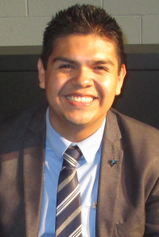 Alfredo Barcenas
Alfredo Barcenas
The Rule of Law and The Magna Carta
In 1215, civil war loomed in England between powerful barons and King.
The barons offered King John an opportunity, a deal, to avoid civil war. They presented him with the Magna Carta.
The Magna Carta set out the feudal rights of the barons and demanded that King John agree to rule only if he promised to abide by the established laws and customs of the land and the specific terms of the Magna Carta.
The Magna Carta became the first written document compelling an English king (or any other king) to act according to the rule of law.
Some of the more general rights and liberties in the Magna Carta have become part of the English and American constitutions and have influenced democratic governments throughout the world.
So, what is “Rule of Law” of the Magna Carta that we have inherited? How is it defined in our society?
The term “rule of law” is defined as the restriction of the arbitrary exercise of power by subordinating it to well-defined and established laws.
That’s what the Magna Carta did. Reduce King John’s powers to a specific set of rules and terms.
Without the rule of law, we have Law of the Jungle. Only the strong survives!
The rule of law is upheld by four fundamental principles:
The government and its officials and agents as well as individuals and private entities are accountable under the law.
The laws are clear, publicized, stable, and just; are applied evenly; and protect fundamental rights, including the security of persons and property.
The process by which the laws are enacted, administered, and enforced is accessible, fair, and efficient.
Justice is delivered by competent, ethical, and independent representatives who are of sufficient number, have adequate resources, and reflect the makeup of the communities they serve.
In a society governed by the rule of law, the government and its officials are subject to and are held accountable under the laws of the land.
Modern democratic societies have developed systems of checks and balances, both constitutional and institutional, to limit the reach of excessive government power, and to subject the government power, or ruler, to legal restraints.
In a society governed by the rule of law, there is less corruption and government abuse their power.
There is less bribery, extortion, improper influence by public or private interests (rent seeking), and misappropriation of public funds or other resources.
In a society governed by the rule of law, fundamental rights are more likely to be guaranteed. Our Bill of Rights guarantees us a whole bundle of rights. So does the Universal Declaration of Human Rights, though it is a declaration and not necessarily enforceable in a court of law.
Our rights as Americans are protected by due process. Our government cannot take our liberties — freedom of expression, belief, religion, press, assembly and association — without due process of law.
Security from arbitrary deprivation of life, liberty and property is the defining aspects of the rule of law.
In a rule of law society, ordinary people should be able to resolve their grievances and obtain remedies in conformity with fundamental rights through formal institutions of justice in a peaceful and effective manner without resorting to violence or self-help.
The rule of law requires that the justice system be accessible, affordable, effective, impartial, and culturally competent. Accessibility includes general awareness of available remedies; availability and affordability of legal advice and representation; and the absence of excessive or unreasonable fees and hurdles.
Our American traditions and practices of the rule of law have their origins in the Magna Carta.
Articles 39 and 40 of the Magna Carta are part of the foundation of our Constitution and Bill of Rights.
Article 39 provides, “No freeman is to be taken or imprisoned or disseised of his free tenement or of his liberties or free customs, or outlawed or exiled or in any way ruined, nor will we go against such a man or send against him save by lawful judgment of his peers or by the law of the land.”
Article 40 provides, “To no one will we sell, to no one will we refuse or delay, right or justice.”
The founders of the American Republic basically took these two articles of the Magna Carta and incorporated them as central features of the U.S. Constitution.
King John’s promise to abide by Articles 39 and 40 was interpreted in the seventeenth century as a fundamental protection of the personal liberties of all subjects.
The influence of the Magna Carta can be seen in our Bill of Rights.
Article 39 of the Magna Carta recognized that all freemen of the kingdom were equals under the law and no one may be deprived of property “except by the lawful judgment of his peers or by the law of the land.
Article 39 is embodied in the 5th and 14th amendments to the U.S. Constitution. Both amendments state, “No person shall be … deprived of life, liberty or property without due process of law …”
The influence of the Magna Carta on American constitutional governance cannot be understated. Many of our liberties and governmental forms trace back to the Magna Carta. We are indebted to those who crafted the Magna Carta.
Thank You.
 Holly Garcia
Holly Garcia
The Magna Carta and the American Constitution
I will be talking to you about the influence of the Magna Carta on the Founders of the American Republic and the drafting of the U.S. Constitution.
My colleagues have spoken about what the Magna Carta and why it was so important to England back in the thirteenth century.
But does the Magna Carta have any relevance to Americans who lived some 240 years ago?
Did the Magna Carta help shape the writing of the U.S. Constitution?
Did it inspire the writing of the U.S. Constitution?
First, I want to draw a parallel between historical facts.
The barons drafted the Magna Carta as a Constitution for King John.
The Magna Carta told King John what he could and could not do.
He certainly could not do all of the nasty things he did before the Magna Carta like jail people he did not like, steal from the people, and sell justice to anyone willing to pay him the highest sum.
For the barons, the Magna Carta was an ultimatum. King John will accept it and conduct himself accordingly or deal with a rebellion and possibly civil war.
King John had no choice. The barons did not show up at Runnymead on June 15, 1215 to negotiate and discuss. They were there to tell him, “Take it or leave it.” If he does not take it, he will have to fight them. King John did not have the resources to fight. He accepted.
But the barons did not wake up one day and say to themselves, “Hey, we need a Magna Carta to stick it in King John’s face.”
They had been pleading and begging the King to go easy on them, not to tax them as much; not to send his sheriffs and forcibly take their corn, carts and possessions.
It was only as a last resort that they came up with the Magna Carta.
Well, I see a parallel in our Declaration of Independence.
Like the barons in 1215, leaders of the American colonies declared their independence after pleading and begging King George for years to treat them like ordinary British subjects.
The reason they rebelled and declared a revolution was because they were being denied their rights as British citizens, not as “Americans”.
They only got their identity as “Americans” after they declared, fought and won their revolution.
In the run up to the Declaration of Independence, time and again they begged King George to treat them fairly.
They begged him not to tax them without representation.
They begged him not to deny them jury trials and the right to assembly.
They begged him to govern themselves without his representatives telling them what to do.
When they issued the Declaration of Independence, they made it very clear:
“We hold these truths to be self-evident, that all Men are created equal, that they are endowed by their Creator with certain unalienable Rights, that among these are Life, Liberty and the Pursuit of Happiness. That to secure these rights, Governments are instituted among Men, deriving their just powers from the consent of the governed, — That whenever any Form of Government becomes destructive of these ends, it is the Right of the People to alter or to abolish it, and to institute new Government, laying its foundation on such principles and organizing its powers in such form, as to them shall seem most likely to effect their Safety and Happiness.
They were in no position to negotiate paddling across the Delaware River. They had no Runnymeade to go to.
Unlike the barons, the American colonists simply opted to kick the British out.
Of course, after kicking out the British, they had to manage their own affairs of government.
They had to come up with ideas that suited them.
Most importantly, they had learned valuable lessons from their colonial experience.
First, they did not want a king or anyone that looked like a king.
They did not want concentration of power in one person or one institution.
They wanted to maximize protection of individual liberties.
They weren’t looking to establish a new tyranny. They wanted to form a new government, free from tyranny.
So they experimented with a confederation. Basically, they got together and tried to create a national government that could handle their common business.
But they did not give this national government much power. More importantly, they didn’t give it the power to tax. Of course, without taxes, it is impossible to run government.
In 1787, they got together and drafted the constitution we have today.
I think the 1787 Constitution is our American Magna Carta.
Of course, it was not directed against a particular king or ruler.
Our Constitution is directed against any ruler and any institution at any time.
Our Constitution, just like the Magna Carta, imposes specific limitations on government itself.
The Magna Carta said the king must abide by the law of the land.
Our Constitution called itself the Law of the Land.
In Article 6 of the Constitution is the Supremacy clause.
It reads: “This Constitution, and the laws of the United States which shall be made in pursuance thereof; and all treaties made, or which shall be made, under the authority of the United States, shall be the supreme law of the land; and the judges in every state shall be bound thereby, anything in the Constitution or laws of any State to the contrary notwithstanding.”
Article 39 of the Magna Carta said pretty much the same thing: “No freemen shall be taken or imprisoned or disseized or exiled or in any way destroyed, nor will we go upon him nor send upon him, except by the lawful judgment of his peers or by the law of the land.”
In these provisions, of course, the underlying principle is the rule of law.
The Magna Carta is the rule of law the king must live by. The Constitution is the rule by which government in America must live by.
Whereas in the Magna Carta the barons tried to limit the king’s power by imposing limitations on his power and creating a Council of 25 barons to enforce the terms of the Magna Carta, in the U.S. Constitution, the founders used a different technique.
They used the principle of separation of powers.
That means government powers will be divided into three branches. There will be those who make laws, those who implement them and those who interpret them.
Each one would be in a position to check the other from exceeding its powers. That way, government is controlled and the possibility of tyranny reduced.
In the Magna Carta, the barons were particularly concerned about their individual liberties. They wanted to make sure that if they lost their lives, liberties and properties, it was going to be according to the “law of the land”, which means any laws the king may pass must be consistent with the Magna Carta.
Well, in our Constitution, we have a Bill of Rights.
Within the Bill of Rights are some of the most important liberties: freedom of speech, religion, and press; but most of all, due process.
The due process that was developed in the Magna Carta resonates in the fourth, fifth, sixth, seventh, and eighth amendments.
Without these enumerated rights, where would we be?
Without rights limiting the government’s ability to search and seize property, what could we have done?
Without guarantees against excessive bail, cruel and unusual punishments, fair trials by juries?
I say we would have been no better off than those barons under the tyranny of King John.
So what is the common thread that ties the Magna Carta and the U.S Constitution across an expanse of some 600 years?
I think it is a simple idea.
The barons and the American founders wanted to establish a government of laws and not of men. They wanted to establish a government based on the rule of law rather than the rule of men.
Let me conclude with the words of the English philosopher Michael Oakshott:
“The rule of law bakes no bread, it is unable to distribute loaves or fishes (it has none), and it cannot protect itself against external assault, but it remains the most civilized and least burdensome conception of a state yet to be devised.”
Thank you.
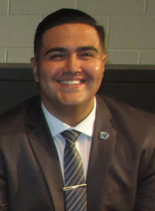 Juan Garcia Moreno
Juan Garcia Moreno
The Magna Carta and the Universal Declaration of Human Rights
Thank you all for coming out today to celebrate the 800th anniversary of the Magna Carta with us.
I am going to explore with you the roots of the Universal Declaration of Human Rights in the Magna Carta.
Many of you here probably know that the Universal Declaration of Human Rights is the one human rights document accepted by every country on the planet.
You might think of the Declaration as a Bill of Rights for all humanity. All human beings, regardless of color, race, gender, geography, language or religion have rights. That is what the Declaration is dedicated to protect.
These rights are birth rights. By being born human, all human beings have the rights mentioned in the Declaration.
The Declaration recognizes only one thing about humans. Their humanity. I would say the Declaration is an instrument designed to control and restrain man’s inhumanity to man.
Often man’s inhumanity to man is seen in what oppressive governments do.
Dictatorships and tyrannical governments jail, torture, and even kill their citizens arbitrarily, just because they want to and have the guns to do it.
They deny personal liberties to their citizens such as the right to free speech, assembly and worship.
The principal weapon in restraining man’s inhumanity to man is the rule of law. Reduced to a simple phrase, that is what the Universal Declaration of Human Rights is all about. The rule of law!
Of course, the principle of rule of law in the Declaration is rooted in the Magna Carta.
In the past few minutes, you have heard, and will hear after my presentation, a lot about the Magna Carta and the rule of law from my distinguished colleagues.
But I have a slightly different take.
So, I am going to talk to you about the Magna Carta and how it has informed and inspired the writing of the Universal Declaration of Human Rights.
I will begin by posing my first question: What aspects of the Magna Carta inform the Universal Declaration of Human Rights?
First, let me say that the Magna Carta is fundamentally about the protection of life, liberty and property.
In 63 articles, the Magna Carta dealt with a whole variety of things.
It covered taxation without representation, recognized that the people, namely the barons, had liberties and their rights that cannot be taken in violation of the law of the land.
The Magna Carta guaranteed no sheriff of the king could hold court and judge the people as he wants.
It prohibited the king’s sheriffs from taking the private property of the people arbitrarily, just because they want to.
It prohibited the king from taking anyone’s horses, corn , wood or carts without the consent of the free man.
It prohibited the king from depriving anyone of his liberty without the “judgment of his peers, or by the laws of the land.” That is the famous Article 39.
The king agreed not to “sell, deny, or delay right or justice”. That is the famous Article 40.
There are others.
We actually find these very same principles and ideas in the Universal Declaration of Human Rights.
When the United Nations was created on October 24, 1945, it was founded on the belief that through collective collaboration the world could stave off another major worldwide conflict.
The idea in forming the U.N. was that open dialogues, informed decision making, and shared collaborations between world leaders could create world peace.
The Universal Declaration of Human Rights was drafted by a committee comprised of representatives from 9 different countries, and spearheaded Eleanor Roosevelt.
Eleanor Roosevelt, President Roosevelt’s better half, has a special status in the history of human rights. Some people call her the Mother of the Modern Human Rights movement.
Mrs. Roosevelt, chaired the UDHR drafting committee. She is today recognized as the driving force for the Declaration’s adoption.
The Universal Declaration of Human Rights was created in an effort to have a common standard of what rights are inalienable, and therefore no government cannot take them away.
It was adopted by the United Nations on December 10, 1948.
The Universal Declaration of Human Rights covers fundamental rights like the “right to life, liberty and security of person.”
In recent years, the United Nations has updated the aspirations of the Universal Declaration to encompass more rights, such as the right to water and sanitation.
When the Universal Declaration of Human Rights was adopted by the United Nations in 1948, it was heralded as “a Magna Carta for all human kind”.
What aspects of the Magna Carta inform the UDHR?
It could be argued that the Magna Carta indirectly led to the creation of the Universal Declaration of Human Rights.
To see this we have to examine the Magna Carta in specific ways and compare it to the Universal Declaration of Human Rights.
One of the first rights protected by the Magna Carta is the right to equal and just treatment under law. Article 39 of the Magna Carta says, “No freeman shall be arrested or imprisoned or deprived of his freehold or outlawed or banished or in any way ruined, nor will we take or order action against him, except by the lawful judgment of his equals and according to the law of the land.”
Article 6 of the Declaration says, “Everyone has the right to recognition everywhere as a person before the law.” Article 9 says, “No one shall be subjected to arbitrary arrest, detention or exile.” Article 10 of the UDHR says, “Everyone is entitled in full equality to a fair and public hearing by an independent and impartial tribunal, in the determination of his rights and obligations and of any criminal charge against him.” Article 11 of the UDHR expands on Article 39 of the Magna Carta. “Everyone charged with a penal offence has the right to be presumed innocent until proved guilty according to law in a public trial at which he has had all the guarantees necessary for his defence.”
Article 39 of the Magna Carta says, “No freemen shall be exiled… except by the lawful judgment of his peers or by the law of the land.” Article 13 of the UDHR says, “Everyone has the right to freedom of movement and residence within the borders of each state. Everyone has the right to leave any country, including his own, and to return to his country.”
Article 17 of the Magna Carta says, “Common pleas shall not follow our court, but shall be held in some fixed place.” Article 39 of the Magna Carta says “ No freemen shall be taken or imprisoned … except by the lawful judgment of his peers or by the law of the land.”
Article 16 of the UDHR says, “Men and women of full age, without any limitation due to race, nationality or religion, have the right to marry and to found a family. They are entitled to equal rights as to marriage, during marriage and at its dissolution. Article 6 of the Magna Carta says, “Heirs shall be married without disparagement, yet so that before the marriage takes place the nearest in blood to that heir shall have notice.”
Article 39 says, “No freemen shall be… disseised (property taken) … except by the lawful judgment of his peers or by the law of the land.” Article 17 of the UDHR says, “Everyone has the right to own property alone as well as in association with others. No one shall be arbitrarily deprived of his property.”
There are other similarities between the Magna Carta and the Universal Declaration of Human Rights.
Could there have been a Universal Declaration of Human Rights without the Magna Carta? I would argue that there could be. The Manga Carta is the catalyst for all human rights. But the Declaration would have been a fundamentally, radically, different document. Here is why. The Magna Carta is the catalyst for all human rights. It is an English created document. It has evolved through English common law. It has been filtered through the English Petition of Rights and even the U.S. Constitution. All of the human rights in these documents are rooted in the Magna Carta, including the right to be protected from arbitrary rule and due process. The Universal Declaration is the latest restatement of the Magna Carta for a modern age and a new generation and it carries within its words 800 years of wisdom and practice on the rule of law.
Thank you.
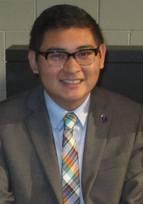 Edgar Lopez
Edgar Lopez
Does the Magna Carta Offer Lessons to the Developing World?
In America, we uphold certain values as being important to us. For example, our liberty.
We have a Bill of Rights that guarantees us the right to speak freely, worship freely, protest freely, along with various other freedoms. We hold these freedoms to be true to all people regardless of a person’s station in life. We value representation in our democracy. No taxation without representation and freedom from oppression are core values we hold dear as Americans.
While such is the case for us in America, there are many countries in the developing world that do not hold these truths or enjoy these freedoms. We see and hear news of citizens in developing countries being thrown in jail just for speaking their minds and jailed for peaceful opposition. Those who oppose the government in these countries are often tortured and persecuted simply because those in government do not like them.
The barons forced King John to accept the Magna Carta to limit his tyranny and arbitrary rule. They actually forced him to put his royal seal, which was his signature, on the document.
There was a need for a Magna Carta.
King John jailed people, stole from them cheated them out their property. He denied them their natural rights. The barons wanted him to enter into a contract with them and promise to live and rule by a set of clearly written rules.
Today, in many developing countries the are dictators who behave as did King John 800 years ago.
As King John stole from his barons, modern dictators in the developing world steal from their people.
King John was corrupt. He terrorized, oppressed and killed his barons and others as he liked. That is exactly what dictators in Africa, Latin America and Asia do today.
The despotism and tyranny of the days of King John are alive and well in many developing countries today.
There are two things that are common to the tyrannical regime of King John and modern dictators in the developing world. That is the absence of the rule of law and due process.
This is why I believe the developing countries need their own Magna Carta. It will be a Magna Carta of the oppressed masses to be imposed on the dictators. It will be a Magna Carta that demands the rule of law and due process of law.
What do I mean by rule of law?
I mean rule of law as opposed to rule of men; rule of dictators.
I mean a government itself governed by the rule of law not rule of guns.
It will be a binding contract imposed on the dictators.
In America, we may not appreciate what it means to live under a dictatorship, rule of a bunch of men with guns.
Imagine a society without any enforceable set laws, but one based on the wishes of one ruler or a small group of powerful rulers.
You don’t have to go far to imagine that because it is happening in many developing countries today.
Just look at Somalia. It has not had a government since 1991. They have no workable constitution. The rule of law there is the rule of the gun on the bed of a pick-up truck.
The clan leaders are not held to any law. They do whatever they want to do including commit crimes against humanity.
Many other African countries face similar challenges. Africa echoes with the silence of the rule of law.
Due process is lacking in much of the developing world today. What do I mean by “due process” ?
In our Constitution, we have guarantees that “no person shall be deprived of life, liberty, or property without due process.”
So what does that mean? It means many things. But most importantly, it means that all legal proceedings will be fair. That means the accused will be given notice of charges and a fair opportunity to be heard before the government acts to take away one’s life, liberty, or property. It also means having jury trial, adequate legal representation and fair adjudication.
Due process is lacking in much of the developing. That is why a new Magna Carta is needed specifically for the developing world.
The people of the developing countries must impose their own Magna Carta on their dictatorial rulers to ensure the application of the rule of law.
There have been efforts to do just that from the outside. But there has not been much success. We have recently seen organizations such as the International Criminal Court (ICC) becoming toothless. Kenyan president Uhuru Kenyatta was indicted by the ICC but was never brought to trial.
We have the right principles but not the right tools to be bring those accused of major human rights crimes to swift justice.
For instance, we see the right principles developed in the ICC Rome Statute and in the African Human and People’s Rights. How many criminals against humanity have been brought to justice? But how effective are these conventions?
I believe the Magna Carta has a great deal of relevance for the developing world today. It just needs to be updated for the developing world.
The Magna Carta is much more than just a document. It is a symbol of freedom from tyranny. It is a symbol of the rule of law. It is a symbol of freedom from oppression which our founders mimicked when they created the United States in 1776.
A new Magna Carta is needed for the oppressed masses in the developing world along the same lines as the Magna Carta of 1215. Dictators should sign a contract with their people not to steal from them, jail or kill them arbitrarily.
Thank You.
 Jamie Carper
Jamie Carper
The Magna Carta and Due Process
I am going to talk about the Magna Carta and Due process.
I am sure many of you have heard the phrase ‘due process’ at some time in your lives.
It is a very important concept.
It is so important that it is mentioned not once but twice in our Constitution.
In our Bill of Rights, specifically in the Fifth Amendment is written, “No person shall be deprived of life, liberty, or property, without due process of law.” That amendment applied only to the Federal government.
The 14th Amendment was passed following the Civil War to specifically apply to the states. It reads, “No state shall be deprive any person life, liberty, or property, without due process of law.”
These are very powerful words.
What does due process mean and where did it come from?
It actually comes from Article 39 of the Magna Carta.
Article 39 says, “No freemen shall be taken or imprisoned or disseised or exiled or in any way destroyed, nor will we go upon him nor send upon him, except by the lawful judgment of his peers or by the law of the land.
The key phrase is “law of the land.”
When the barons presented the Magna Carta to King John to put his seal, sign, they were not interested in negotiating. They were fed up with his tyranny and extortion.
He would tax them however he pleased.
He would sell justice to the highest bidder. Since he was the ultimate authority in the kingdom, people who had disputes would appeal to him and pay to get the justice they could afford.
He would fine them for small and big things.
He would use his sheriffs to forcibly jail his opponents and take away their property.
He would take their corn, horses, carts and whatever without paying for it.
He would jail people without witnesses.
So article 39 was intended to put an end to that. “No freemen shall be taken or imprisoned or disseised or exiled or in any way destroyed, nor will we go upon him nor send upon him, except by the lawful judgment of his peers or by the law of the land.”
After the Magna Carta, the king can only take the liberty of people, that means jail them, only according to the law of the land (Magna Carta) and by the judgement of their peers.
Similarly, the king could take someone’s property only according to the law of the land and by the judgement of their peers.
That is really the meaning of due process. It’s about fairness. The Magna Carta is really about fairness!
Government cannot put people in jail without giving them a fair trial and without a judgment of their peers. The important phrase here is FAIR TRIAL. That means at least some form of jury trial.
But due process is not one thing. It is many things.
And under our Bill of Rights, due process includes many rights.
For instance, under the 5th amendment, the government gets only one chance to prosecute us if it accuses us of a crime.
Only one bite at the apple. So, the government is prohibited from putting someone on trial time and again. That is called double jeopardy.
Due process in the 5th amendment also means that a criminal suspect has the right not to incriminate himself or herself. Today we know that as Miranda Rights.
The police must advise a suspect that he or she has the right to remain silent, they have a right to an attorney, if they can’t afford one the government will give them one free of charge and that anything they say to the police can and will be used against them
In other words, criminal suspects do not have to say anything to the police if they are being questioned in custody.
In the 6th amendment, we have a whole bunch of other due process rights.
Before a person is deprived of his life, meaning that the person is given the death penalty, or liberty, that person goes to jail, he or she has a right to a public trial
They have a right to a public trial. That means anybody can walk in and observe the trial.
They have a right to a lawyer. If they are poor the government is required to give them one free of charge.
They have a right to an impartial jury. The prosecutor cannot say they are going to try the case before a judge. Jury trial is an absolute right of the individual.
Those accused of a crime have a right to be notified of the charges against them. The government must specifically tell them what it is they did wrong, what law they violated and the time and place of violation.
They have a right to confront their accusers. In other words, they have a right to cross examine witnesses against them and discredit them.
But they have an absolute right not to testify against themselves. The prosecutor cannot call the defendant to the stand and ask him or her questions.
Under the 8th Amendment, we have a right against cruel and unusual punishment.
Even the vilest of mass murderers has a right not to lose his life in a manner that is cruel and unusual.
Some of you might be aware that there is a case before the Supreme Court on how to execute a person condemned to death. Is it a cruel and unusual punishment for a death row inmate to be given drugs that cause him severe pain before it kills him?
Consider that!
There are other unwritten but widely accepted principles of due process.
One of them is the presumption of innocence. Every person accused of a crime is presumed to be innocent until the government proves guilt.
The accused does not have any burden to prove or disprove anything.
The entire burden of proof is on the government.
The burden of proof on the government is a very high one.
Proof that the defendant most likely did it is insufficient to establish guilt.
If a juror has a gut feeling based on the proof – it again falls short of finding guilt.
Being sure is not even enough.
In order for a jury to find guilt in a criminal case, there must be proof beyond a reasonable doubt.
If the jury has just one doubt based on reason, they must acquit!
They don’t need a whole bunch of doubt just one doubt based on reasonable doubt. ONE REASONABLE DOUBT.
So what is the larger purpose of due process?
The essential purposes of due process have not changed since the days of the Magna Carta and Article 39.
Due process protects citizens from a tyrannical and abusive government.
Just imagine if the police could beat a confession out of you and use it in a court of law.
You don’t have to imagine because they could do that until the Supreme Court established the Miranda Rule in 1966.
Imagine being charged with a major crime and having a trial without a lawyer because you are too poor to afford one and going to jail.
You don’t have to imagine that because until 1963 thousands of poor people went to jail not necessarily because they committed a crime but because they did not have a lawyer to defend them.
Imagine the police searching your home without a warrant and using evidence they find to convict you at trial.
You don’t have to imagine that because until 1961, that used to be the rule.
Imagine having a trial before an all white jury and you are not a white defendant. What do you think are the chances of you getting a fair trial before that jury?
You don’t have to imagine that because until 1986, prosecutors were able to weed out, as they called it, minority jurors in jury selection often resulting in all white juries.
What would we be without due process?
The answer to that question does not require a lot of imagination.
One only has to look at countries in Africa, Latin America and Asia.
As indicated earlier by both Dr. Mariam and Edgar, it is common in many African countries for people to be arrested without probable cause and held in detention indefinitely.
I will conclude my presentation with a thought.
Due Process is the glue that holds all of our freedoms.
Due Process is the shield that protects us from tyranny.
It is foundation that holds our liberty.
We have the Magna Carta to thank for this.
Thank You.
 McKenzie Kelly
McKenzie Kelly
The Magna Carta and the Youth Generation
I am going to talk to you about the Magna Carta and the younger generation. The question is whether an 800 year old document has any relevance to the youth of today.
You have heard from my distinguished colleagues about the Magna Carta; why it was created, how it established the rule of law and set limits on the exercise of political power.
The Magna Carta and the ideas in it have molded our society and how we see the role of government.
But is the Magna Carta truly relevant in today’s society, especially to the youth?
The Magna Carta was originally written as a list of grievances and demands from the barons to their king, which my colleagues have so eloquently portrayed here.
Since the Magna Carta, others have repeatedly made similar demands including the American colonies who had their own revolution against England.
No government will ever be perfect, but it is good to desire and work for perfection.
The Magna Carta is not perfect but its spirit and words are relevant. It provides the youth of today with a template to re-write the Magna Carta and retrofit it for our generation.
Let me explain what I mean when I say “rewrite” or “retrofit”.
When the barons drafted the Magna Carta they had certain things in mind. They aimed to end the tyranny of King John. They wanted their rights to life, liberty and property protected. They wanted to live under the rule of law, not the whims and fancy of King John.
The barons demanded justice, transparency, and accountability from their king. They did not want to live in fear of their king.
With that being said where do we go from here for the youth?
The Magna Carta is important and we owe much of our constitutional design and language to it.
But we live in an ever changing world. In the age of technology our world can literally change in seconds.
Yet we are still governed and live by the laws and rules of our parents and grandparents.
But the time of our parents and grandparents is fading quickly. That is why we need to re-write the Magna Carta to address the needs of our own generation.
The United Nations estimates that over 70% of the world’s population is under the age of 35, and this age group has experienced the most rapid social change in the recorded history of humanity because of technology.
So it is only natural that we be the ones to change the destiny of the world we live in with our large number.
So I ask my second question: What would be the nature of a youth Magna Carta? What would be our demands?
In the 1215 Magna Carta, the barons object to a tyrannical king.
I think our Magna Carta should demand relief from the tyrannical circumstances we have been put under as well freedom from the tyranny of outmoded ideas.
Let’s talk about education for example.
All of us in this room are burdened by enormous educational debt simply because we wanted to further our education, and free our minds from ignorance. And yet we are enslaved; enslaved by our educational debt.
We have to borrow more and more every year just to stay in school and finish. It takes some of us 6 years to graduate because we have to work to pay our school expenses.
Education should be our birthright, not a prize given to the highest bidder. King John sold justice to the highest bidder. It should not only be the rich who should be able to afford higher education.
Just like the barons believed they had a right to their properties, we should have the right to free education. That is the one “property” we have that determines our life chances.
In many Western countries, that is actually the rule. Sweden, Norway, Finland and even in Argentina higher education is free to those qualifed to attend.
The second item we should include in our Manga Carta is complete freedom from censorship.
Today technology has made it possible for the rise of a global youth culture. Around the world, our generation has the ability to unite and create the kind of world they want to shape. We live in an era of technology, we can blog and share ideas across various platforms, just look at all these apps. I don’t even know what all of them are; but take Facebook for example.
It is one of the best ways to communicate internationally; and that’s great and it’s awesome and we take that for granted here in the United States. For millions of youth in Africa, China, the Middle East and other parts of the world, youth are denied access to social media. In many countries, young people are jailed for blogging or expressing their views about their governments. In our generation’s Magna Carta, we shall demand an end to all forms of censorship.
There is a third item we shall include in our Youth Magna Carta. That is freedom from arbitrary and useless incarceration. There are millions of youth who are imprisoned and their life’s opportunities shattered because they used drug.
Drug offenses should be treated as a public health issue, not issues for the criminal justice system. Many young lives are destroyed in the criminal justice system because of drug related incarcerations.
The numbers speak for themselves: 1.5 million people under the age of 35 are incarcerated for drug offences. And while state and local governments spent $74 billion on incarceration, court proceedings, probation and parole for substance-involved adult and juvenile offenders, they spent less than 1% of that amount—$632 million—on prevention and treatment
It is important to rehabilitate and reintegrate youth whose lives have been affected by drugs and help them become a productive part of society.
Fourth, there should be guaranteed support for children in poverty. A demand we need to make in the new Magna Carta is protection for children in impoverished circumstances. Throughout the world millions of children are left in poverty for no fault of their own. Many die and those who survive end up being burdens to society.
According to UNICEF over 1 billion children suffer from at least one form of deprivation. It could be health, nutrition, water, sanitation, shelter or education. Often impoverished children are deprived of numerous things at once.
The cost of impoverished children on global societies is enormous. It affects economic development, global health and increases inequality that often results in violent revolutions.
There is just one more thing that I would like to add as a demand. It has been a pretty hot topic in the past couple weeks with Ireland’s new vote for marriage rights. In our generation’s Magna Carta we need to demand the removal of discriminatory laws that affect our marriage rights.
There are many places in the world where women and men, I won’t be sexist, that are sold to people for them to marry. Often teenage girls are sold or even given to men three times their age. Men that should have nothing to do with teenage children.
There are places in the world where parents make arranged marriages for their children because they want to keep their properties together or they feel their children need to maintain their status or achieve a higher one. They can’t marry for love. They marry because they are told they have to marry.
Even here in the United States, there are people who are not allowed to marry each other because of gender. There are still 12 states that still do not allow same sex marriage. You may not agree with it, I might not agree with it, but that is not the point. Who has the right to tell you who and who you can’t marry.
Think about that for a second, if I told you can’t marry him or her because s/he is a different color than you, that’s not rational, but yet governments do that. Our own government does that. We need to incorporate this into the Magna Carta. We have to. No one should ever tell you who you can’t marry based on race, ethnicity, religion, political affiliations or gender because no one should be able to tell you who you can and cannot love.
So in closing, these are just some of the few ideas that are necessary to be incorporated in to our Magna Carta, absolutely necessary and these don’t even scratch the surface, the list goes on and on. But here’s the thing, paper rights are worthless in the absence of mechanisms to hold rulers to account.
We are 70% of the world’s population today. Why are we not the mechanisms of accountability?
Our rights should be protected. For King John the alternative was civil war. For us the alternative is a global youth revolution!
Thank you.
Lacie Hall and Jodi Buckley
Is the Magna Carta Relevant to Women?
When King John put his seal on the Magna Carta in 1215, women did not have many rights. We are, of course, referring to the aristocratic women, heiresses and wealthy widows of the time, not commoners.
It is obvious to say that no women (baronesses) were present when King John was asked to put his seal on the Magna Carta. The fact that the Magna Carta does not extend any real rights to women is an indication that it does not consider women to be equal to men. The document lists rights for men, mainly barons, but only two articles in the document mention the rights for women.

Article 8 of the Magna Carta states, “No widow shall be compelled to marry, so long as she wishes to remain without a husband. But she must give security that she will not marry without royal consent, if she holds her lands of the Crown, or without the consent of whatever other lord she may hold them of.”
Why should a woman get permission from the king to remarry? Of course, she cannot be compelled to remarry, but how meaningful or useful is it for a woman to have a right to remarry but the ultimate decision comes from the king? So the right in Article 8 is not much of a right at all if they have to get permission from the King to remarry.
King John by making himself a “guardian of widows” was not necessarily concerned about the welfare of widows. When he became their “guardian”, he got a cut from the property the women inherited. John was a greedy king. Beyond that, he gave himself the power to even arrange marriages for wealthy widows to one of his military leaders to buy their loyalty and generate revenue for his endless wars.
Interestingly, the Magna Carta specifically refers to two women. In Article 59, the Magna Carta refers to the “return of the sisters and hostages of Alexander, King of Scotland, his liberties and his rights, we will treat him in the same way as our other barons of England.” King John had held hostage the teenaged princesses Margaret and Isabella following his invasion of Scotland in 1209. They were later released.
The Magna Carta’s references to women to the extent that they have limited to property rights. Thirteenth century aristocratic and baronial English women once married gave themselves and their properties to their husbands. The woman’s property legally belonged to her husband. They shared the same legal identity.
Aristocratic women in King John’s days were often married young and their husbands “owned” them and legally controlled their property. The women were bound to their men. It could be their fathers, husbands and ultimately the King.
When the Magna Carta was written, women had limited rights. That was the culture of the time. But the inequality of women recognized in the Magna Carta continued throughout the ages right up to our American Constitution and many constitutions over the past two centuries.
Women in America did not get the right to vote until 1920 with the passage of the 19th Amendment.
American women were discriminated in the professions. Even the U.S. Supreme Court in 1872 said that women were not naturally suited to the profession of the law. The Court decided, “The natural and proper timidity and delicacy which belongs to the female sex evidently unfits it for many of the occupations of civil life.” The first female U.S. Supreme Court Justice Sandra Day O’Connor could not get a law firm to hire her in 1950 when she graduated from law school. No firm would hire a female lawyer.
In 1972, an Equal Rights Amendment (ERA) was proposed to the states for ratification. It would have prevented all discrimination based on gender. Despite ten years of relentless efforts, it failed to get ratification.
Gender inequality still persists. In the United States women make approximately $0.72 for every $1.00 a man makes. That is true four decades after the passage of the Equal Pay Act. The 1964 Civil Rights Act bans discrimination in employment on the basis of sex. But discrimination continues.
But the idea of women having some rights established in the Magna Carta has in the long run helped women in America become self-sufficient. Over the past three decades, more women have earned higher educational degrees than men in the U.S., including graduate degrees.
The Magna Carta still inspires greater liberties and equality for women. The identification of clear legal rights for heiresses and widows in 1215 has set a precedent for legislation in future centuries to allow women personal autonomy in marriage and control over their property. Today, freedom from forced marriage is recognized by the United Nations as a fundamental human right. There are international laws prohibiting gender-based discrimination and the right of women to be treated equally.
The Magna Carta inspired and influenced all subsequent human rights documents. Because the Magna Carta was not strong on women’s rights, it set the precedent for many centuries of women’s second class status in society. Our Declaration of Independence and our Constitution also did not mention the basic rights of women. Would women’s rights have been radically different if their rights had been recognized 800 years ago? But interestingly, it provides a strong framework for the protection of human rights and woman rights. It is not a perfect document but in 800 years it still continues to be perfected.
The Magna Carta would have been a radically revolutionary document had it listed the rights of women, especially their right to be treated equally with men. The barons wrote the Magna Carta to protect themselves from the tyranny of King John. How about a Magna Carta to protect women from the tyranny of John, Jimmy and Harry?
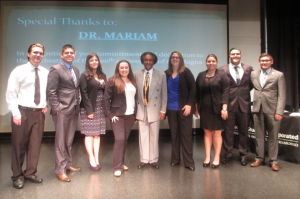
Al Mariam
Concluding Remarks
As we conclude our celebrations, I want you to reflect on the words of Judge Learned Hand. Judge Learned Hand was one of the greatest jurists in American jurisprudence. He served on the United States Court of Appeals for the Second Circuit until his passing in 1961.
Judge Hand’s words reflect my views and I am sure the panelists’ as well.
I do not believe liberty is protected by words on parchment or paper. Neither is it protected by an army of judges and lawyers.
Liberty needs no fortress to protect and preserve it.
I believe there is only one thing that is necessary for liberty to stay alive, to thrive and to flourish: The iron will of good men and men and women everywhere to be free.
Free to think or not.
Free to believe or not.
Free to express oneself or not.
Liberty needs the iron will of men and women of good will to protect it from the iron fists of tyrants the world over.
Judge Hand said it best in his “Spirit of Liberty” speech:
We have gathered here to affirm a faith, a faith in a common purpose, a common conviction, a common devotion. Some of us have chosen America as the land of our adoption; the rest have come from those who did the same.
For this reason we have some right to consider ourselves a picked group, a group of those who had the courage to break from the past and brave the dangers and the loneliness of a strange land. What was the object that nerved us, or those who went before us, to this choice?
I often wonder whether we do not rest our hopes too much upon constitutions, upon laws and upon courts. These are false hopes; believe me, these are false hopes. Liberty lies in the hearts of men and women; when it dies there, no constitution, no law, no court can even do much to help it.
While it lies there it needs no constitution, no law, no court to save it. And what is this liberty which must lie in the hearts of men and women? It is not the ruthless, the unbridled will; it is not freedom to do as one likes.
That is the denial of liberty, and leads straight to its overthrow. A society in which men recognize no check upon their freedom soon becomes a society where freedom is the possession of only a savage few; as we have learned to our sorrow.
“What then is the spirit of liberty? I cannot define it; I can only tell you my own faith.
The spirit of liberty is the spirit which is not too sure that it is right;
The spirit of liberty is the spirit which seeks to understand the mind of other men and women;
The spirit of liberty is the spirit which weighs their interests alongside its own without bias;
The spirit of liberty remembers that not even a sparrow falls to earth unheeded…”
And in that “spirit of liberty” I bid you all farewell and SEE YOU IN 800 YEARS.
Thank you all very much!
====================
Brief biographical notes on the presenters:
Arlene Carrillo graduates with a B.A. in Political Science in June 2015. She will be attending Whittier Law School in the Fall. She is the first in her family to graduate college. She hopes to use her legal training to help those who have limited access to legal services and “to give back to my parents who have made so many sacrifices for me.”
Alfredo Barcenas is a fourth year political science major. He is a first generation college student and the first in his family to pursue higher education. As part of his collegiate career, Barcenas has served as the student body President and Vice-President at CSUSB and currently serves as the Vice-President of University Affairs for the California State Student Association. Barcenas plans on attending law school in the Fall of 2016 and practice constitutional and immigration law upon graduation.
Juan Garcia Moreno, born in Colombia, immigrated with his parents to the U.S. when he was 4 years old. He has a dual major in Political Science and Geography- Global Studies and three minors in pre-law, political economy and Latin American studies. Once he completes his undergraduate degree, he expects to attend a joint J.D.-M.A program on the East Coast. His ultimate goal is to either work for the foreign service of the United States or the United Nations.
Holly Garcia is a senior graduating with a B.A. in political science at CSUSB. She is a proud mother of two boys. She will be attending law school in the Fall.
Edgar Lopez is a senior graduating with a B.A. in political science at CSUSB. Ed was selected to become a Panetta Institute Congressional Intern, one of 21 students in the California State University System, to receive such honor. He worked in the office of Congressman Buck McKewon who chaired the House Veteran Affairs Committee. Ed is also the External Relations Director for the Associated Students Inc. on the CSUSB campus.
Jamie Carper worked in the entertainment industry for a number of years before returning to complete his undergraduate degree. He is graduating with B.A. in Administration and will be attending law school in the Fall. In his extra time, Jamie works on anti-spam litigation and hopes to one day join the Federal Trade Commission.
McKenzie Kelly is a fourth year Biology student. She has participated in the CSUSB Model United Nation Program since 2014 and is currently serving as the program assistant for the program. She hopes to attend a Physician’s Assistant program in the Fall of 2016 and earn a Master’s degree in Physician Assistant Studies. Her goal is to work in the medical humanitarian field and ultimately join with Médecins Sans Frontières.
Lacie Hall is a political science major at CSUSB graduating with B.A. in June 2015. She graduates with departmental honors. She will be attending graduate school in the Fall.
Jodi Buckley is a political science major at CSUSB with a minor in Pre-Law. She will receive her B.A. in Political Science in June 2015. She will be attending the graduate program in National Security Studies at CSUSB in the Fall. She hopes to be a strong advocate for human rights and the fundamental principle of the Magna Carta, the rule of law.


